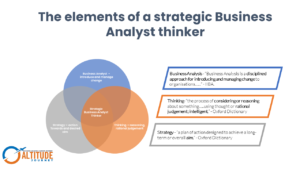Don’t Just Break the Mold, Shatter It: Rebel Recipes for the Business Analyst Maverick
Photo by Nik on Unsplash
Picture this: You’re sailing on the vast ocean of the business world, navigating the wild waves of change. As a business analyst, you’re the captain of your ship, and your map? It’s pre-skilling – the compass that keeps you not just afloat but steering ahead of the storm. Gone are the days of up-skilling after the fact or re-skilling in the wake of a career hurricane. We’re talking about getting your sea legs “before” the tides turn. Ready to dive in? Let’s set sail!
Why Fit In When You Can Stand Out?
In the high-speed freeway of today’s business, being market fit isn’t just about keeping pace – it’s about setting the pace. As a business analyst, you’re not just in the driver’s seat; you’re also the navigator, the pit crew, and the spark plug all in one. Your adaptability isn’t just a cool party trick; it’s your bread and butter.
Pre-skilling is like having a crystal ball. It’s about harnessing your inner oracle to forecast the skills of tomorrow and training in them today. You don’t just react to change; you dance with it, two steps ahead, making waves rather than riding them.
Talent and Skill Development: The Game’s Changing, Are You?
If you think of your career as a video game, pre-skilling is the cheat code that helps you level up “before” the boss fight. The digital domain is like a game that updates overnight – new rules, new players, new goals. Traditional skill development is playing catch-up, but pre-skilling? It’s got you downloading the updates before they even hit the main server.
Pre-skilling: Not Just Another Buzzword
You see, pre-skilling isn’t a band-aid; it’s a blueprint. It’s not learning to fix a leak; it’s engineering a ship that rides the waves like a pro. It’s the difference between retrofitting your armor mid-battle and showing up with an indestructible suit.
Advertisement
Sailing the Pre-skilling Seas: How to Do It Right
So, you’re convinced pre-skilling is the way to go. But how do you sail these uncharted waters? Here’s your treasure map:
1. Potential Over Past Glory
Forget what you were; what you “can be” is the real gold. Cultivate a mindset that treasures soft skills – the ability to learn, adapt, and bounce back like a superhero.
2. Feedback is Your North Star
Steer by the stars of feedback and career guidance. Have real talks with the crew – managers, mentors, peers – to chart a course that aligns with the future, not just the now.
3. Broaden the Horizon
Your skill set is an ocean – vast and deep. Don’t swim in the kiddie pool. Dive into new knowledge areas, and you’ll find yourself swimming with the dolphins instead of the goldfish.
4. Captain Skills
In the AI-cohabited world, leadership is your sword. Sharpen it. Guide your crew with vision, inspire them with your cause, and lead them through the foggy seas of change.
5. All Hands on Deck for Diversity
Steer clear of the Sirens of sameness. Champion cognitive diversity and inclusive leadership. Different minds on deck make for a robust and innovative ship.
6. Spyglass on Trends
Keep your spyglass fixed on industry winds and currents. Trend analysis isn’t just fancy talk; it’s how you predict the next big wave and ride it like a pro.
7. Market Maps for Skills
Use market analysis to spot uncharted islands of opportunity. Customize your skill set to be the first to plant your flag and claim the land.
8. Bridging Skill Gaps
Perform a gap analysis like you’re checking for leaks. Find where you’re lacking and patch it up before it’s time to face the kraken.
9. Strategic Pre-skilling
Combine all these tools, and you’ve got yourself a pre-skilling compass that points true north. Use it to not just stay on course but to discover new worlds.
Conclusion: Charting Your Course to Market Fitness
So, what’s the final word for our intrepid business analysts navigating the shifting sands of the corporate landscape?
The key takeaway is that the art of pre-skilling is not just a strategy; it’s a dynamic, forward-thinking mindset. It’s about embracing the power of foresight and the excitement of what’s yet to come. In a world that’s racing towards an unknown future, pre-skilling is your secret superpower. It’s the equivalent of giving your career a jetpack, where others might settle for a safety net.
Remember, the sea of business is as merciless as it is magnificent. The winds of change are relentless, and the tides of technology wait for no one. By embracing pre-skilling, you become the captain of your destiny, navigating through the gales with grace and gusto.
To thrive as a market-fit business analyst, you must treat change like it’s your best friend. Why? Because it is! Change is the one constant you can rely on to bring you new opportunities, insights, and paths to personal and professional growth. When you pre-skill, you’re not just keeping pace; you’re setting the pace, transforming from a player to a game-changer in your industry.
By investing in pre-skilling, you’re not just enhancing your resume; you’re forging a professional identity that’s as resilient as it is versatile. This identity becomes your brand, signaling to employers and colleagues alike that you’re not only equipped to handle the challenges of today but also the revolutions of tomorrow.





